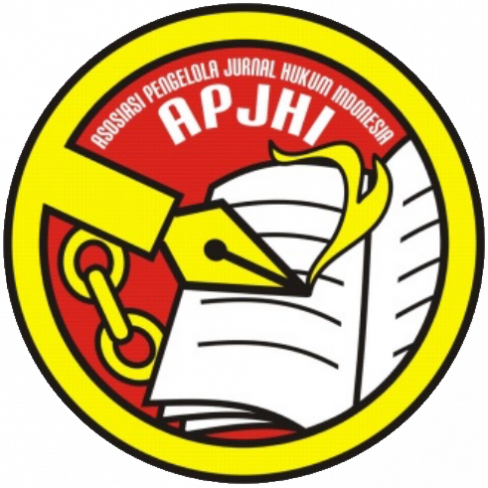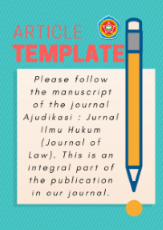Implikasi Ideologi Pancasila pada Gerakan Sosial Islam dalam Prinsip Demokrasi Konstitusional
DOI:
https://doi.org/10.30656/ajudikasi.v4i2.3003Keywords:
Implication; Ideology; Pancasila; Social movement; Constitutional.Abstract
Pancasila implementation should not be used as a substantive source in aspects of law and legislation in Indonesia. Pancasila as the highest source of law in Indonesia is actualized in every behavior and action both individually and collectively. Social movements are a characteristic and manifestation of democratic principles as a reflection and reaction to social dynamics in society. The research method used is in the form of qualitative research which tries to explore a meaning arising from social dynamics. The influence of the Pancasila ideology on every social movement, especially the Islamic social movement, is based on the view of life together within the framework of the Indonesian nation and the concept of a rule of law. The consequence of the principle of constitutional democracy in implementing the Pancasila values ​​framework is not a threat to democracy, because the values ​​of Pancasila also provide respect for the rights of the people which are in line with the principles of constitutional democracy.
Keywords: Implication; Ideology; Pancasila; Social movement; Constitutional.
Downloads
References
Adiwilaga, Rendy. “Gerakan Islam Politik Dan Proyek Historis Penegakkan Islamisme Di Indonesia.†Jurnal Wacana Politik 2, no. 1 (2017): 1–9. https://doi.org/https://doi.org/10.24198/jwp.v2i1.11373.
Aziz, Abdul, Imam Tholkhah, and Soetarman Soetarman. Gerakan Islam Kontemporer Di Indonesia. Cet. Ke-3. Jakarta: Diva Pustaka, 2006.
Creswell, John W. Research Design, Pendekatan Kualitatif, Kuantitatif Dan Mixed. Third Ed. Yogyakarta: Pustaka Pelajar, 2015.
Efendi, Syahrul. Mengapa Gerakan Islam Gagal? Cet. Ke-1. Jakarta: Ummacom Press, 2012.
Faqih, Ahmad. “Dialektika Orientasi Gerakan Sosial Keagamaan (Islam) Di Indonesia.†Jurnal At-Taqaddum 3, no. 1 (2011): 89–104.
Fuqoha, Fuqoha. “The Influence War On Terrorism Policy of United States of America Against Radical Islamic Movement Development In Indonesia (Study Case The Mujahedeen Council of Indonesia).†Digital Library - Perpustakaan Pusat Unikom. Universitas Komputer Indonesia, 2010. https://elib.unikom.ac.id/gdl.php?mod=browse&op=read&id=jbptunikompp-gdl-fuqohanim4-22706.
Fuqoha, Fuqoha, and Indrianti Azhar Firdausi. “Kebijakan Pemerintah Dalam Aktualisasi Pancasila Melalui Media Sosial Ditinjau Dari Perspektif Sosiologi Komunikasi.†Jurnal Desentralisasi Dan Kebijakan Publik 01, no. 01 (2020): 14–26. https://e-jurnal.lppmunsera.org/index.php/JDKP/article/view/1808.
Fuqoha, Fuqoha, and Sukendar Sukendar. “Dinamika Gerakan Sosial Politik Islam Dalam Pemilihan Umum Presiden Indonesia 2019.†In Konferensi Nasional Ilmu Administrasi. Bandung: STIA-LAN, 2018.
Fuqoha, Fuqoha, Ahmad Sururi, and Hasuri Hasuri. “Gerakan Sosial Islam Diantara Gagasan Demokrasi Konstitusional Dan Ancaman Radikalisme Di Indonesia.†Jurnal Mahkamah 2, no. 1 (2018): 42–55. https://journal.iaimnumetrolampung.ac.id/index.php/jm/article/view/252.
Jurdi, Syafruddin. “Gerakan Sosial Islam : Kemunculan, Eskalasi, Pembentukan Blok Politik Dan Tipologi Artikulasi Gerakan.†Jurnal Politik Profetik 1, no. 1 (2013): 1–24. https://doi.org/https://doi.org/10.24252/jpp.v1i1.1615.
Karim, Syahrir, and Syamsu Adabi Mamat. “Islamisme Dan Demokratisasi Di Indonesia Pasca Reformasi : Analisis Sosio-Politik.†Sulesana 7, no. 2 (2012): 149–59. http://journal.uin-alauddin.ac.id/index.php/sls/article/view/1387.
Maimun, Maimun. “Meredam Ideologi Radikal Di Indonesia Melalui Praktik Keteladanan Nilai Pancasila.†Jurnal Administrasi Negara 3, no. 2 (2015): 26–33. https://doi.org/https://doi.org/10.30656/sawala.v3i2.230.
Maksudi, Beddy Iriawan. Sistem Politik Indonesia : Pemahaman Secara Teoretik Dan Empirik. 1st ed. Jakarta: Rajawali Press, 2013.
Mashad, Dhurorudin. Akar Konflik Politik Islam Di Indonesia. Jakarta: Pustaka Al-Kautsar, 2008.
Simorangkir, Jungjungan. “Islam Pasca Orde Baru.†Istinbath 15, no. 2 (2016): 199–216. http://jurnal.radenfatah.ac.id/index.php/istinbath/article/view/794.
Sudjana, Eggi. Islam Fungsional. Ed.1. Jakarta: Rajawali, 2008.
Sudrajat, Suryana, and Abdul Malik, eds. Negara Darurat Etika. Cet. Ke-1. Serang: Serabook, 2018.
Syarbaini, Syahrial. Pendidikan Pancasila Di Perguruan Tinggi. Jakarta: Ghalia Indonesia, 2001.
Downloads
Published
Issue
Section
License
Authors who publish with this journal agree to the following terms:
Authors retain copyright and grant the journal right of first publication with the work simultaneously licensed under a Creative Commons Attribution License that allows others to share the work with an acknowledgment of the work's authorship and initial publication in this journal.
Authors can enter into separate, additional contractual arrangements for the non-exclusive distribution of the journal's published version of the work (e.g., post it to an institutional repository or publish it in a book) with an acknowledgment of its initial publication in this journal.
Authors are permitted and encouraged to post their work online (e.g., in institutional repositories or on their website) before and during the submission process, as it can lead to productive exchanges and earlier and greater citation of published work.
All articles in Ajudikasi : Jurnal Ilmu Hukum can be disseminated provided they include the identity of the article and the source of the article (Ajudikasi : Jurnal Ilmu Hukum). The publisher is not responsible for the contents of the article. The content of the article is the sole responsibility of the author
Ajudikasi : Jurnal Ilmu Hukum is lincensed under a Creative Commons Attribution-ShareAlike 4.0 International License.










1.png)
.png)
.png)





.png)
.png)
.png)
.png)





.png)







